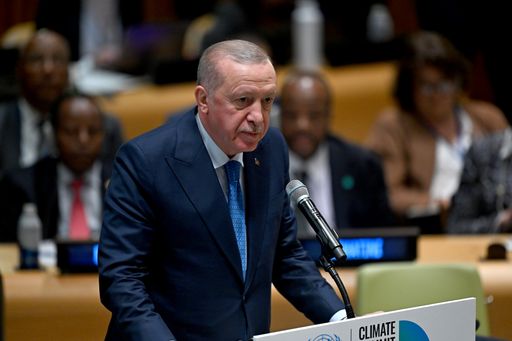Chinese President Xi Jinping has told the United Nations that by 2035 his country plans to reduce its greenhouse gas emissions by 7–10 percent below peak levels, while also calling out "some countries" for resisting the global clean energy transition.
Speaking via live video from Beijing to a climate leaders’ summit hosted by UN Secretary-General Antonio Guterres, Xi announced China’s national climate plan, expected ahead of the COP30 summit in Brazil in November.
Xi said China will boost its installed wind and solar power capacity to more than six times 2020 levels within 10 years and increase the share of non-fossil fuels in domestic energy consumption to over 30 percent by 2035.
"Green and low-carbon transformation is the trend of our times," Xi said.
"Despite some countries going against the trend, the international community should stay on the right track, maintain unwavering confidence, unwavering action, and undiminished efforts."
He urged developed nations to take the lead on stronger emissions cuts.
Türkiye, pioneer in renewable energy
Turkish President Recep Tayyip Erdogan also addressed the summit, saying Türkiye has raised the share of renewable energy in total installed capacity to more than 60 percent this year.
"While increasing the share of renewable energy and improving energy efficiency, we are expanding low-carbon technologies in industry," Erdogan said in New York.
"In line with our net zero emissions target for 2053, we will continue to transform key sectors."
Erdogan said Türkiye is establishing an emissions trading system, implementing a green finance strategy, and creating a national green taxonomy.
He noted that climate policy is based on seven pillars: energy, industry, buildings, transportation, waste, agriculture and forestry.

US - Europe dissimilarity
The climate summit came a day after US President Donald Trump told the UN General Assembly that climate crisis is a "con job," criticising China and the EU for investing in renewable energy.
The US is withdrawing from the 2015 Paris Agreement, which sought to limit global warming below 1.5C.
Brazilian President Luiz Inacio Lula da Silva, host of COP30, warned that the Belem summit will test whether governments "believe in what the science is showing us."
European leaders echoed urgency.
Spain’s Pedro Sanchez said ambition is "backsliding" despite record wildfires.
Dutch Prime Minister Dick Schoof said international cooperation remains essential.
Austria’s Alexander Van der Bellen noted a 14 percent cut in emissions and pledged climate neutrality by 2040.
Britain announced contracts for two carbon capture projects expected to create 500 jobs and cut 1.2 million tons of CO2 a year.
French President Emmanuel Macron reaffirmed France’s commitment to carbon neutrality by 2050, calling for a fossil fuel phaseout, methane reduction, and protection of ecosystems.
"We must accelerate, we must protect, and we must mobilise together. That is the only way forward," he said.




















